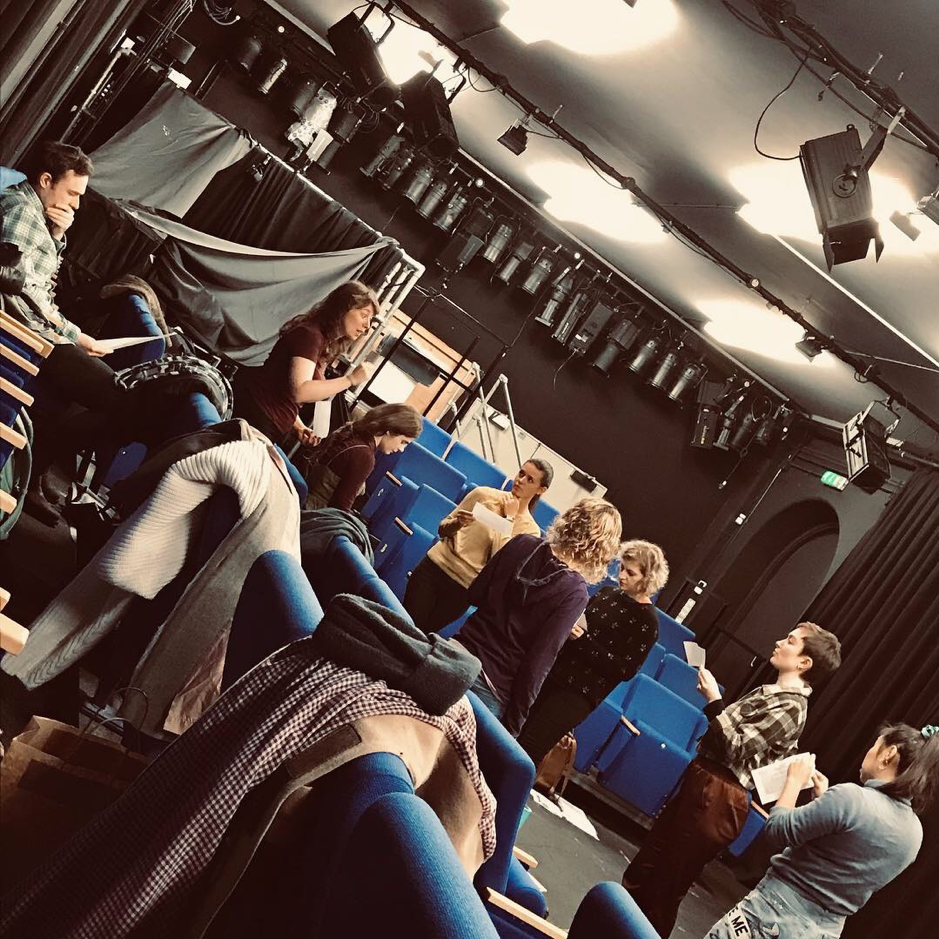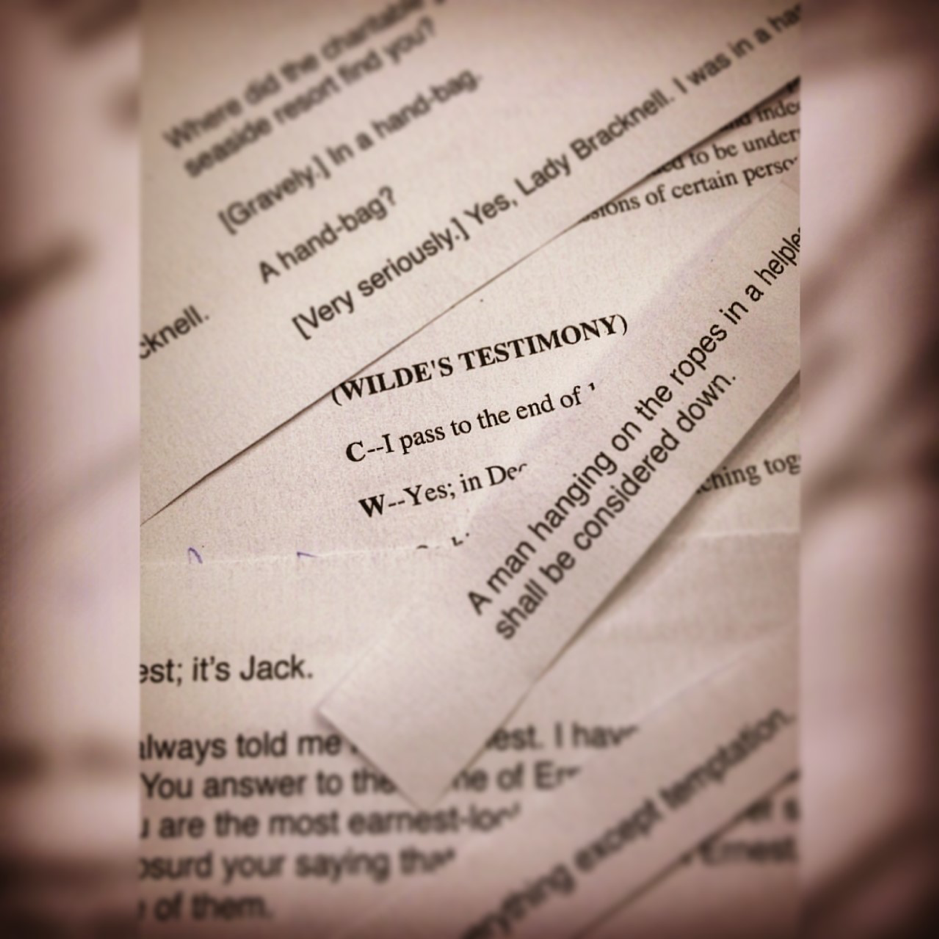Survival in the arts is a struggle well-known by both artists and purveyors of art, and theatre as a form has evolved rapidly in recent years with increased implementation of technology, the development of game theatre and the vogue of immersive productions. Which begs the question, how does a young unfunded theatre company keep up and survive? How do the up-and-coming innovate without a sponsorship deal from Sony?
“No great artist ever sees things as they really are. If he did, he would cease to be an artist.” – Oscar Wilde
Wilde’s relationship with art is fascinatingly complex. Arguments about aestheticism aside, he was an undisputed champion of art and creativity. From the perspective of my theatre company GOLEM!, Wilde’s idea of seeing beyond intended purpose is the absolute core value behind our work. It feels rather pertinent as at present we’re workshopping “Is He Earnest” as part of Omnibus’ Engine Room which is a project based on the life and works of Oscar Wilde.
To be brief, our practice is fundamentally based in adaptation and pushing the boundaries of what adaptation means. We take original texts and repurpose the dialogue to create a brand new story – often our new work is a direct commentary on the originals and the process ultimately requires a certain ‘breaking into’ the texts. Think of it as fan-fiction reined in by Mayer’s Law – energy cannot be created or destroyed, only transformed. It sounds stuffy, but actually we’re quite cheeky. For example, two days ago we pieced together scraps of court transcriptions, An Ideal Husband, The Ballad of Reading Gaol, The Importance of Being Earnest and we’ve now got a script that’s rechristened Lady Bracknell into ‘Aunt Augusta’ a cucumber obsessed, euphemism slinging Drag Queen hostess of a gay nightclub – who even after lip syncing to Gloria Gaynor, somehow STILL manages to scream about handbags.

Credit | Conor O’Kane From Left – Right | David Fairs, Anna Marsland, Evelyn Lockley, Sarah Lambie, Lowri Amies, Laura Hanna, Doireann May White, Siu-see Hung
We’ve been described as a company that “sticks two fingers up” at purists, a rebellious creative mentality that critics would normally associate with rejection and denial rather than immersion. This leads me to my next tidbit from Oscar:
“If a man approaches a work of art with any desire to exercise authority over it and the artist, he approaches it in such a spirit that he cannot receive any artistic impression from it at all. The work of art is to dominate the work of art. The spectator is to be receptive. He is to be the violin on which the master is to play. And the more completely he can suppress his own silly views, his own foolish prejudices, his own absurd ideas of what Art should be, or should not be, the more likely he is to understand and appreciate the work of art in question.”
It’s a dictum that reminds me of Chipzel, another fellow Irish artist and friend. She’s a brilliant Chiptune DJ and video game composer currently working with Terry Cavanagh, the developer of the game Super Hexagon. Her success led to her giving a TedTalk on creativity called “We Are All Hackers”. (For those unfamiliar with Chiptune, it’s music created by hacking retro gaming consoles to turn them into synthesisers. Chipzel’s weapon of choice is an old GameBoy.) In her talk, she makes two main points. Firstly, that every human being is born with creative capability, which is fostered by the person’s feelings towards curiosity. Secondly, that immersion, inspired by curiosity, allows us to play with placed limitations and overcome them. This in turn generates unexpected creativity and art, and is one of the original interpretations of the word “hacking”.
“Hackers were known to explore their machines, crack them open, see how they work, what makes them tick. If they didn’t have something that worked for them – they’d just make it themselves. Make their own software or build their own machines. The first computers were built with the radical notion of the future that everyone should own a personal computer. And this spurred generations of inquisitive creatives to recalibrate these very machines and to repurpose them into something they were never intended to be. Like me with this GameBoy for example.” – Chipzel
I see a direct comparison here, both with our text devising work at GOLEM! and Wilde’s advice on “experiencing art”. Chipzel continues:
“Hacker activity was known to be joyful, where overcoming problems aroused genuine curiosity and led to a want for more knowledge… It forced me to overcome limitations in a creative way. And that was an important life lesson. But overall it was just fun!
I think as adults we start to become systematic thinkers. We’re constantly stretching logic trying to find answers to things that might not have a logical outcome… But with ego in the driving seat for too long we can end up with this distorted vision of reality… Arrogance brings no contribution to your work, nor does it inspire others.”
Well, it’s a huge understatement to say that Wilde still continues to inspire others. Even now his words are in constant circulation, with over 17,000 posts on Instagram with the hashtag #OscarWildeQuotes. His wit is based in linguistic subversion and play, dismantling the form of an aphorism to create new ones with remarkable ease. One only needs to read his exchanges with Edward Carson in transcripts from his court case to sense that wit in action. In that way he was a hacker too, like Chipzel and like us. So maybe even though we as a company aren’t capitalising on technology to create new work, we’re utilising the original ideology of technology. We’re hacking the hackers! Although we’re far from being adverse to doing so, tech incorporation isn’t something we need our innovation to depend on after all. We just need the joy of inspiration, the openness to experience it and the audacity to play with it.
“We are all born creative. Our academic studies might tell us otherwise, with such little focus on self-discovery, creativity and self-advocacy. Comparison is the thief of joy. Creativity comes from exploring and from being curious. Doing what we could do, not what we should do.” – Chipzel
“We are all in the gutter, but some of us are looking at the stars.” – Oscar Wilde
If you’d like to see Chipzel/Niamh Houston’s TedTalk, see the video below:





